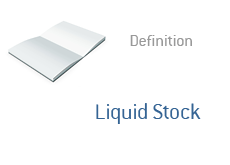Definition of Liquid Stock
What is a "liquid stock"? What is the definition of a "liquid stock"?
First off, liquidity refers to how easily an asset is able to be sold.
If something is "liquid" then it is easily sold. If something is "illiquid" then there is not much of a market for the asset, so selling it will prove to be difficult.
A "liquid asset" could be something like a US government bond, common shares of Google or a GIC. These are all assets that could be sold without any difficulties.
 So then - what is a "liquid stock"?
So then - what is a "liquid stock"?A liquid stock is a stock that is easily sold, due to the fact that there is a large volume of shares traded every day.
Examples of liquid stocks? MSFT, GOOG, INTC, etc.
With a liquid stock, even if you owned a very large number of shares, you could still easily move out of your position due to the fact that so many other people are trading in the stock every day.
If a liquid stock is currently trading at $100, then there is a very good chance that you will get something close to $100 if you decide to dump your shares.
On the other hand, if you had a sizable position in an illiquid stock, then you would likely have to accept the fact that the stock would drop to accommodate your sale.
--
Davemanuel.com Articles That Mention Liquid Stock:
None
